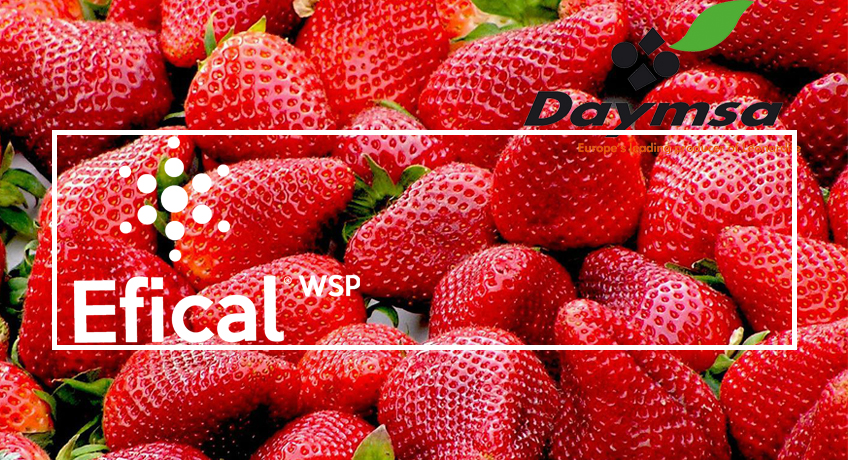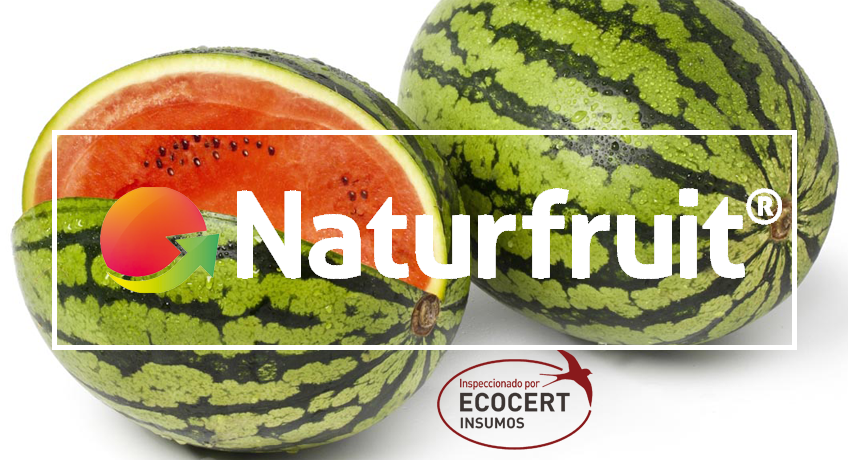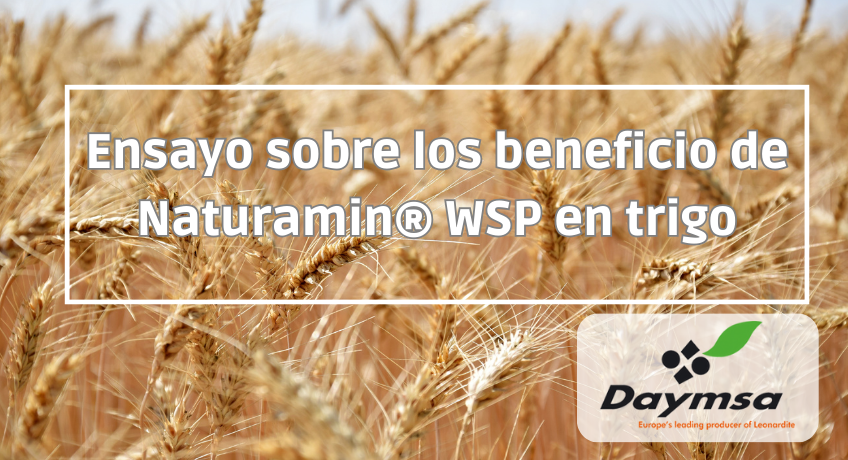
Nov 20, 2023 | Technical articles
Daymsa has carried out a study in Ontario (Canada) confirming the benefits of foliar application of Naturamin® WSP biostimulant on both yield per hectare and specific grain weight.
According to the FAO, in 2021 wheat was the third agricultural product with the highest production worldwide, behind only maize and rice, reaching a volume that rose to 770,877,072 tonnes, 1.84% more than in 2020, where it stood at 756,949,628 tonnes. Nowadays, wheat is a basic product in the agri-food chain, which has become strategic, hence the need for producing countries to maintain production and yields.
In the Top 20 in wheat producing countries, Canada is in 17th position, in a ranking led by Kazakhstan, Iran, Mexico, Syria, China and Russia.
It has been specifically in Canada, where DAYMSA has developed a study to validate the benefits of the use of the biostimulant like Naturamin® WSP in wheat.
Naturamin® WSP is a growth activator in the form of soluble microgranules of high purity and with a high concentration of free amino acids, 80%. It is a biostimulant that is recommended to boost the activity of the crop at times of greater energy demand, helping it to overcome stressful situations (sprouting, drought, pests and diseases, frost, etc.).
Naturamin® WSP is currently internationally certified for use in organic farming.
Study and results of Naturamin® WSP on wheat
During the year 2023, DAYMSA has conducted a study in Ontario (Canada) with the aim of confirming the benefits of Naturamin® WSP on the production of winter wheat (Triticum aestivum/variety 25R61).
In this study, a foliar application was made at the beginning of flowering (BBCH 61), in which yield and specific weight (lbs/bushel) were evaluated.
With a water volume of 200 litres/ha and a dose of 300 grams/ha, a 10% increase in production was observed compared to the control treatment, from 7,013.8 kg/ha to 7,687.7 kg/ha after the application of Naturamin® WSP.
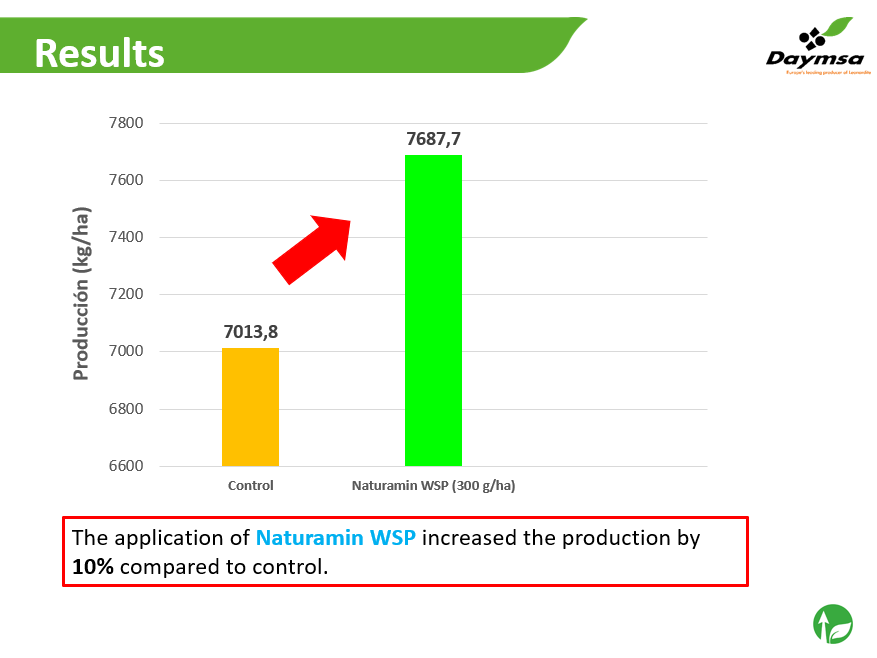
On the other hand, the application of Naturamin® WSP increased the specific weight by 2.7% in relation to the control, raising it from 55.3 lbs/bushel to 56.8 lbs/bushel.
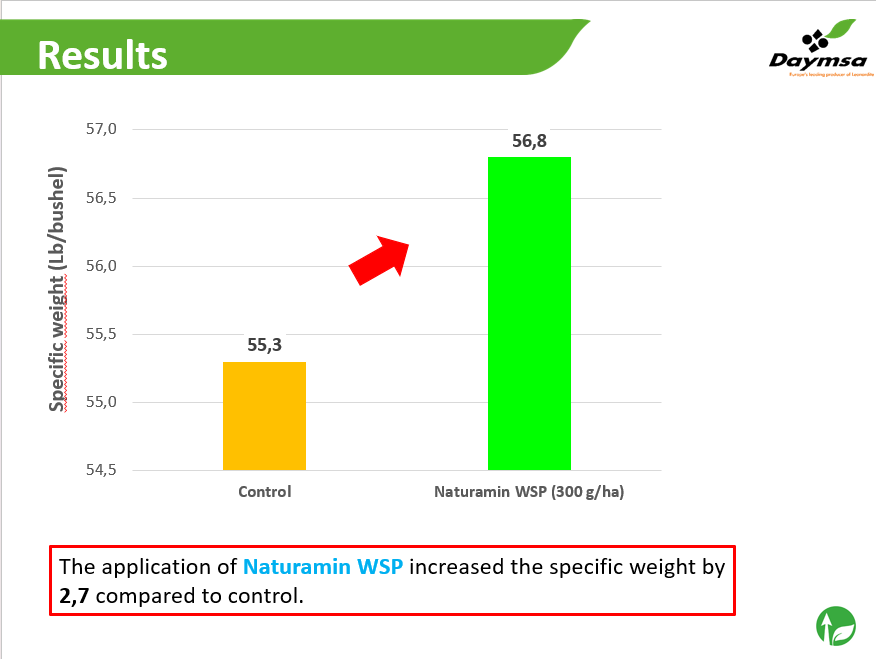
Conclusions
According to the results of the study conducted by DAYMSA in Ontario (Canada) on a winter wheat crop, the foliar application of Naturamin® WSP at the beginning of flowering increases yield (kg/ha) by 10% compared to the untreated control.
In addition, this foliar application has direct benefits on specific weight.
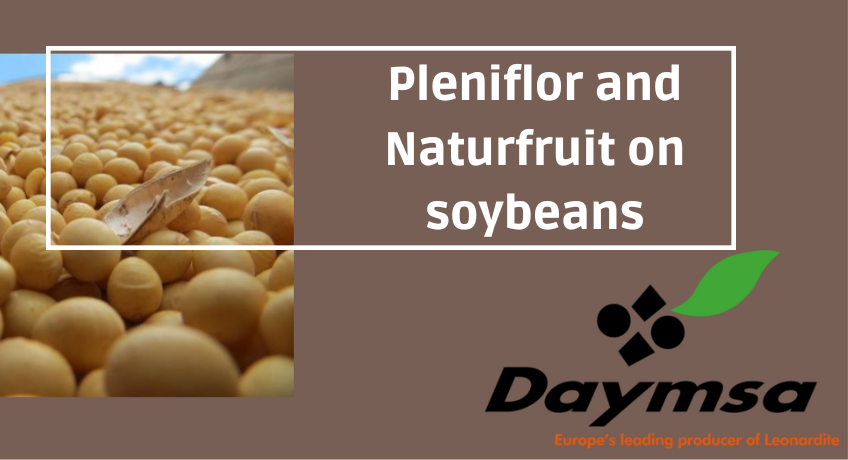
Jun 5, 2023 | Technical articles
Daymsa has carried out trials with Pleniflor and Naturfruit with the main objective of analysing the improvement of grain filling and production in soybean.
Soybean is an annual herbaceous plant, spring-summer, whose vegetative cycle ranges from three to seven months and reaches 40 to 100 cm wingspan. It is a plant sensitive to day length
As regards water requirements, during cultivation, soybean needs at least 300 mm of water, which can be in the form of irrigation when irrigated, or in the form of rain in those humid temperate zones where rainfall is sufficient.
Tests carried out
In order to analyse different vegetative and productive parameters and to increase the production of the soybeans crop, Daymsa has carried out trials on a farm in Salamanca on the Havane variety.
Pleniflor® is a flowering activator.
The phenological stages of the application in soybean (between R1 and R3) were as follows, as can be seen in the following table:
-R1: Beginning of flowering
-R3: Beginning of fruit set
| Var. Nº |
Teatments |
Nº applications |
Dose (l/ha) |
Timing |
| 1 |
UNTRATED PLANTS |
– |
– |
– |
| 2 |
PLENIFOL+NATURFRUIT |
1 |
2+2 |
R1-R3(07 september) |
Results after application of Pleniflor + Naturfruit
The results of the Havane variety after the application of Pleniflor and Naturfruit showed a better flowering and fruit set. After the application of these products, the following data were also analysed, as shown in the table below:
– H%: Percentage of humidity of the grain.
– % Grain protein.
– No. of pods per plant.
– No. of nodes per plant.
– No. of grains per plant.
– Height of the plant (cm).
– Potential yield Kg/ha.
The most important results in terms of percentage compared to the control treatment were as follows:
– Increase in protein content + 7%.
– Increase in the number of grains per pod + 25%.
– Increased yield potential + 25%.
| Variety |
Treatment |
H% |
Protein |
Corrected |
Nº Vainas |
Nº Nudos |
NºGrains |
Height (cm) |
Potential Yield Kg/ha. |
| HAVANE without inocculation |
Pleniflor |
13,39 |
33,5 |
38,68 |
2,5 |
11 |
2,50 |
97 |
4297 |
| HAVANE without innoculation |
Control |
13,58 |
31,3 |
36,22 |
5,50 |
11 |
2,00 |
85 |
3438 |
Pleniflower, flowering and fruit set activator
Pleniflor is a flowering activator and fruit set improver for various crops, especially vegetable and flowering crops.
Pleniflor provides microelements and active substances that are essential in these processes, optimising nutrition at these critical moments. For its preparation, processes are used that maintain all the natural active and soluble components.
Pleniflor is indicated for:
– Stimulating the physiological processes of the plant related to flowering and fruit set, in order to obtain a greater quantity of viable fruit.
– For use mainly on cucurbit species such as melon, watermelon, cucumber, courgette and extensive crops such as rape, soybean and sunflower.
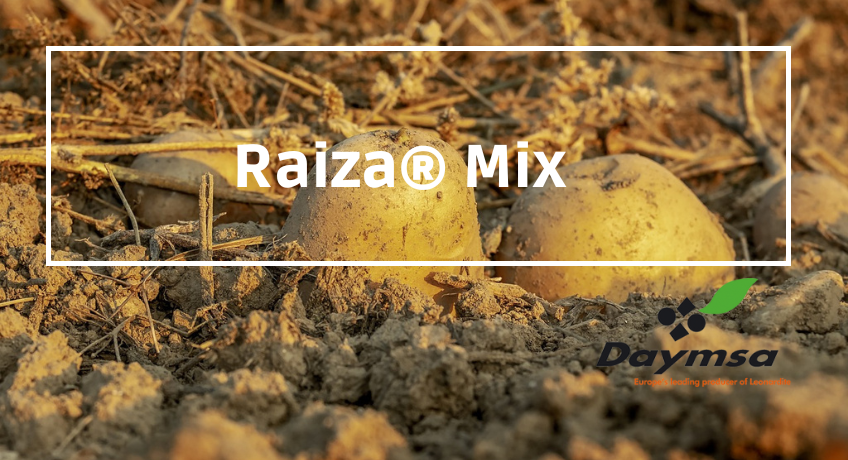
Apr 12, 2023 | Technical articles
Daymsa has carried out a study on seed treatment with Raiza® Mix to analyse the yield and quality of potato production.
Potatoes are one of the most water demanding crops. It needs to have constant availability of this resource to ensure the yield and quality of the tubers, but at the same time it requires well-drained soils to avoid prolonged waterlogging.
During the growing cycle, the potato plants are exposed to the action of a series of pests and diseases, of various origins, which appear during a long period of time, from planting to the end of the vegetative phase. Among the main pests and diseases affecting this crop are the Guatemalan potato moth (Tecia solanivora), the potato flea (Epitrix similars) or the zebra chip (Candidatus Liberibacter solanacearum), the latter usually appearing through invasive insects.
The occurrence of these pests is mainly due to the relatively long period of tuber development in the soil. On the other hand, unfavourable climatic conditions in the period of emergence and subsequent growth of potato plants may be another factor in the occurrence of these pests.
Trials carried out with Raiza® Mix
Daymsa has carried out trials with Raiza® Mix on two potato varieties: Hermes, a Dutch potato, edible, semi-early and useful for the production of French fries, and Tajfun, a medium-early variety that produces large, almost perfectly oval tubers with a slightly yellow skin.
The treatment was carried out a few hours before planting by soaking the potato seeds for 5 minutes in a 0.66% solution, i.e. 0.2 l of Raiza® Mix was dissolved in 30 l of water. The trial was carried out in a light acid soil in a year characterised by an excess of rainfall (134.6 mm above the average of several years) and a significantly different air temperature during the vegetative growing season.
Results
After the application of the 0.66% Raiza® Mix treatment, the Hermes variety achieved an increase in tuber yield of 4.2 t/ha, i.e. 9.9% more than the control, and for the Tajfun variety 4.9 t/ha, i.e. 10.3% more than the control, as shown in the following graphs.
Graph 1. Raiza® Mix effect on the yield of potato variety Hermes
|
Yield potato (t/ha) |
Yield increase (t/ha) |
Increase in performance (%) |
| Control (without treatment) |
42,6 |
– |
100,0 |
| Raiza® Mix (0,66% solution) |
46,8 |
4,2 |
109,9 |
Graph 2. Raiza® Mix on yield of potato Tajfun variety
|
Yield potato (t/ha) |
Yield increase (t/ha) |
Increase in performance (%) |
| Control (without treatment) |
47,7 |
– |
100,0 |
| Raiza® Mix (0,66% solution) |
52,6 |
4,9 |
110,3 |
On the other hand, seed potato treatment with Raiza® Mix also improved the diameter distribution of the tubers produced, which increased the proportion of tubers with a diameter of 35-50 mm for both varieties compared to the control.
Raiza® Mix also contributed to increase in the starch and dry matter content of the tubers compared to the control. The level of nitrate in the tubers was relatively low as shown in the tables below. Regarding the vitamin C content in the fruits, an increase of 20% was achieved in the Tajfun variety, compared to the control treatment.
Graph 3. Effect of Raiza® Mix on the composition of tubers of the Hermes variety
|
Starch (%) |
Nitrate (mg/kg) |
Vitamin C (mg/kg) |
Dry matter (%) |
| Control (without treatment) |
16,0 |
27 |
131,1 |
22,1 |
| Raiza® Mix (0,66% solution) |
16,5 |
34 |
127,7 |
22,6 |
Graph 4. Effect of Raiza® Mix on the composition of Tajfun variety tubers.
|
Starch (%) |
Nitrate (mg/kg) |
Vitamin C (mg/kg) |
Dry matter (%) |
| Control (without treatment) |
15,9 |
28 |
112,5 |
22,1 |
| Raiza® Mix (0,66% solution) |
16,4 |
35 |
134,5 |
22,5 |
Conclusions
The tests carried out showed that after the application of Raiza® Mix on potato seed, great benefits such as increased yield or improved tuber quality were reflected.
In this sense, the application of this product on potato seed stimulated root development and improved nutrient absorption after sowing, favouring uniform germination, vigorous and stress-resistant plants, and helping the crop to reach its maximum productive potential.
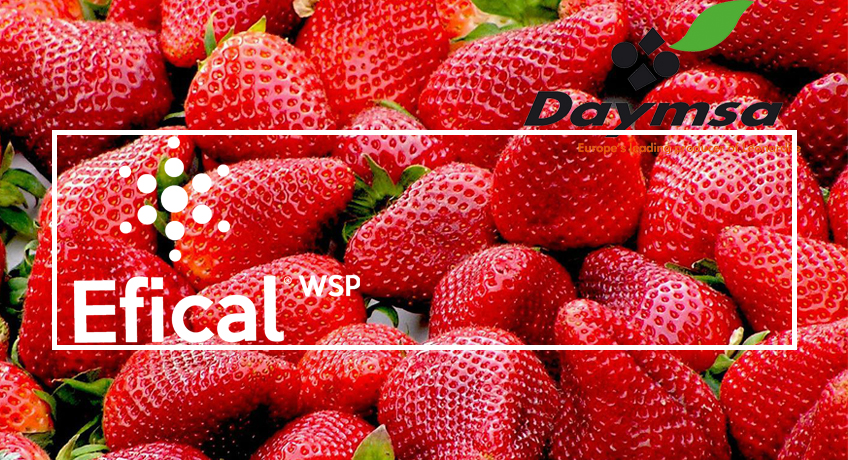
May 23, 2022 | Technical articles
Daymsa continues its commitment with EFICAL WSP, a nutritional solution to address calcium deficiencies on crop quality and post-harvest life in strawberries.
Calcium deficiency in berries can cause crop reduction and quality loss. DAYMSA presents the new applications of EFICALWSP via irrigation for a nutritional solution that facilitates a better absorption of calcium in the plant.
EFICALWSP is a biostimulant with high assimilable calcium richness that manages to increase the quality and post-harvest durability of fruit and vegetables. To improve the life of the harvest, it is essential to increase the level of calcium in the cell wall or “bound calcium”. This can be quantified by specific analysis of calcium pectate molecules. “The main difference that EFICALWSP provides us, is achieves a significant increase in “bound calcium” or calcium in the cell wall, achieving a substantial improvement in the shelf life of our fruit and vegetables”, comments José Carlos Amor, Sales Director of Daymsa.
Application of EFICAL WSP
The trial of EFICALWSP on strawberry via irrigation has been carried out in Moguer (Huelva) on the Strawberry Rábida variety, one of the most common varieties grown in Andalusia. It was carried out by technicians from the testing company ANADIAG.
The objective was to evaluate the content of total calcium and bound calcium in the fruit to see its influence on the quality of the fruit at harvest and post-harvest. The polytunnels in the trial were 85 m long with 800 plants. A total of 9.5 plants per square metre. Four applications of 4kg of EFICAWSP via irrigation were made every 15 days starting on 1 February.
Similar results would have been expected when spreading the doses of these applications on a weekly basis, for those farms where weekly applications are preferred.
Results
Total and bound calcium content was measured in specialised laboratories on fruit samples at different dates during the trial. On the of 16 February results received their last application of EficalWSP on 1 February, in 15 days earlier. An increase in the content of bound calcium was measured in the fruit compared to the control, corresponding to an increase of 17%. This is very interesting because the applicatio
This data is very interesting because the application of Efical WSP was done 15 days before the sampling, which means that the extra calcium supply from Efical WSP has been long lasting.
The next sampling for calcium analysis was done on the 4 of March (harvest three days after having received an application of Efical WSP). It is possible to see an increase in the calcium content bound in the fruit compared to the control, corresponding to an increase of 21%. This is a very positive figure which reflects the fact that the calcium supplied with Efical WSP reaches the fruit quickly.
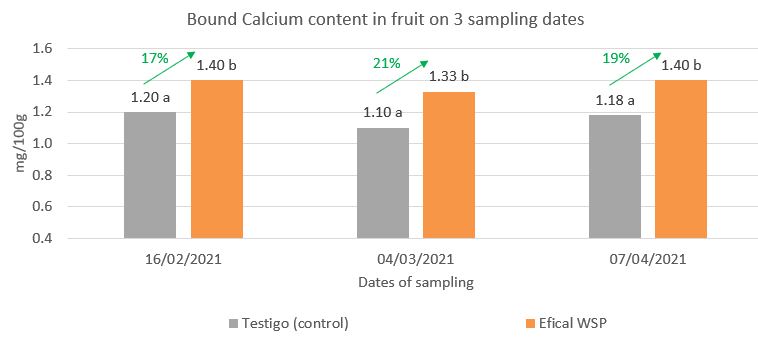
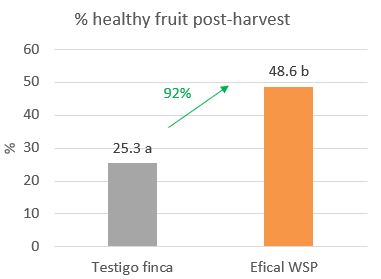
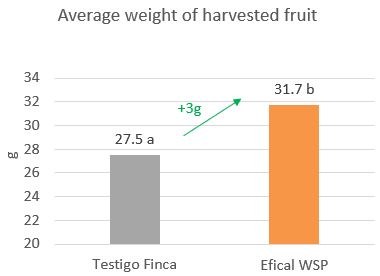
Conclusions
The applications of EFICALWSP via irrigation carried out in this trial on strawberry crops show that the effect after application was rapid and maintained over time, with an increase in total calcium and bound calcium content being observed. This resulted in a higher fruit consistency at harvest and a higher strawberry weight (+3 grams on average). In the post-harvest period, a slowing of weight loss of between 17% and 30% was observed, as well as an increase in healthy fruit without rotting.
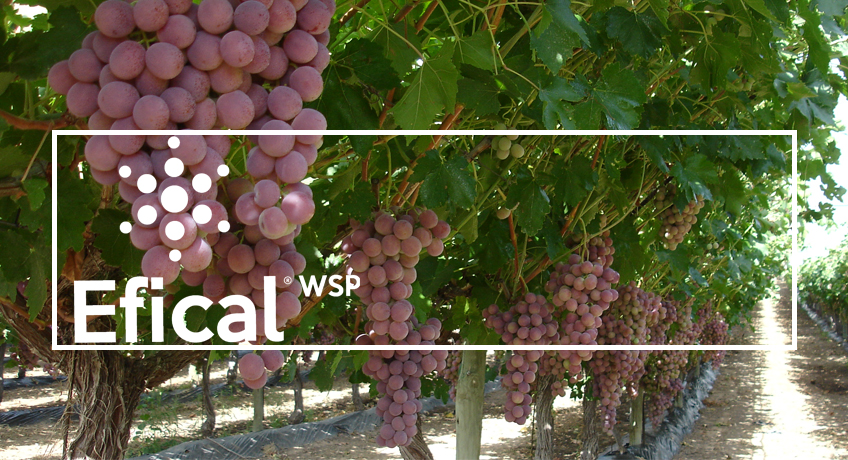
Mar 25, 2022 | Technical articles
DAYMSA presents the benefits of using EficalWSP in the cultivation in grapes after its study carried out in Blanca, in the province of Murcia with Flame seedless variety.
DAYMSA, European leader in the production of biostimulants with a clear commitment to offer natural solutions for the agriculture of tomorrow, reaffirms its commitment to EficalWSP, a nutritional product with a great wealth of assimilable calcium, formulated with free amino-acids and organic complexes that achieve a better absorption and translocation of calcium through the tissues of the plant.
It is also a product that can be used in Organic Agriculture according to EC Regulation 834/2007 and 889/2008, NOP and JAS regulations. Control ECOCERT SA F-32600
Benefits of EficalWSP
The formulation of EficalWSP is designed to facilitate the absorption and distribution of calcium within the plant as it is complexed with organic substances, in addition to stimulating the growth of new roots that will be points of greater calcium absorption. It increases the concentration of calcium in the fruit and green parts, improving firmness and post-harvest quality by being a source of organic calcium that is highly assimilable by the plant.
In this sense, EficalWSP also stands out for its easy handling that it can be used both via foliar and root application in a wide variety of crops with a fast and high solubility in water.
Proper fertilisation with EficalWSP improves plant tissue and reduces the risk of disease penetration. This will be reflected in a better post-harvest life.
Trials carried out on grapes
Daymsa has recently carried out several trials on grapes to study the benefits of EficalWSP.
This was carried out in Blanca, Murcia by the testing company GOES. The objective was to evaluate the increase of calcium in fruit, harvest quality and post-harvest life with EficalWSP application and another source of inorganic calcium via foliar.
The trial was carried out on the Flame seedless variety, the first application was made at the same time as the gibberellic treatment with an application volume of 800 L/ha and the second application 7 days later.
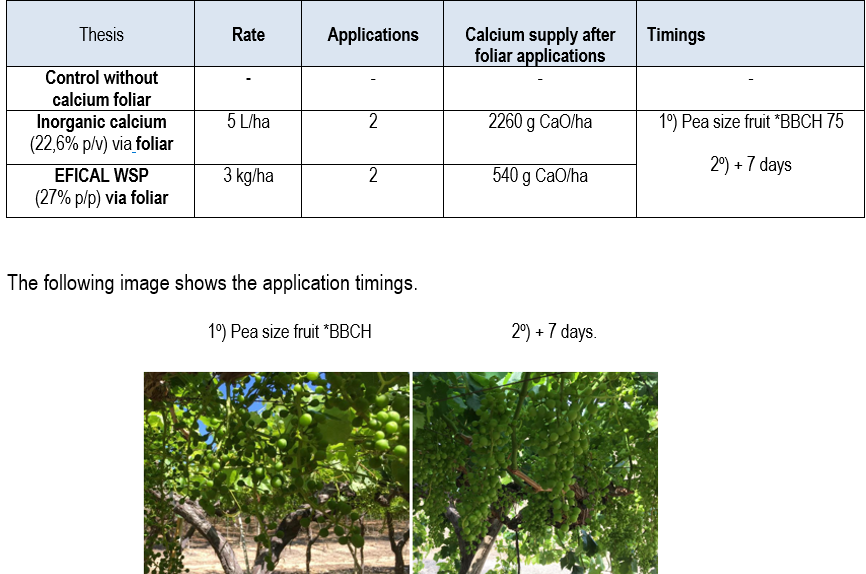
Results
The results at harvest showed increases in size and weight of +5% and +12% respectively after treatments with EficalWSP. This effect on weight and size was not seen with the inorganic calcium (calcium chloride) treatment.

The grapes with the highest calcium content at harvest were those treated with Efical WSP 3kg/ha (+25% bound Ca and +12% total Ca than the control) with significant differences. The treatment with inorganic calcium at 5L/ha resulted in a lower assimilated calcium content despite applying more grams of calcium per hectare.
Berry shatter resistance was measured with a texturometer. It increased with the EficalWSP treatments (result of the structural function of calcium bound in the cell wall).
Post-harvest, after a period of cold storage and shelf life, the percentage of rotten berries was counted. The results showed a 35% reduction in rot compared to the control after the application of Efical WSP.
Conclusion
EficalWSP is suitable for grapes as no stains were observed after foliar applications.
The foliar application of EficalWSP resulted in more assimilated calcium by the plant. Moreover, the organic molecules of the formulation stimulated the growth of the fruit leading to a larger harvest, with increases in grape size and weight of +5% and +12% respectively. Considering an average of 80-120 grapes per bunch on the Flame Seedless variety, this leads to an increase of +56 to +84 grams per bunch, which is a good result.”
Post-harvest, EficalWSP managed to reduce damage by botrytis compared to the untreated control thanks to the calcium strengthening of the cell walls, therefore preventing the pathogens to penetrate the fruits.
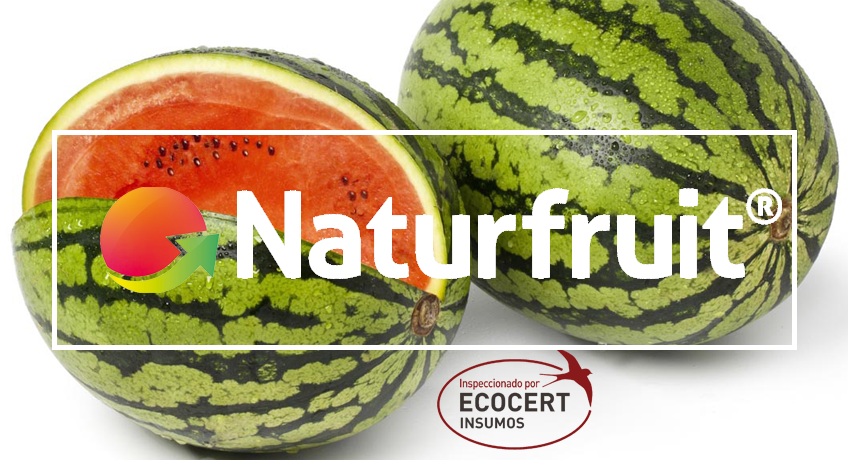
May 19, 2021 | Technical articles
Naturfruit® from DAYMSA has just obtained the ECOCERT organic certification, making it a new solution to potassium needs that is more efficient than traditional fertilizers.
Potassium is a main element for crops, necessary throughout their cycle. But it is during the development phase of the reserve tissues, the productive organs, when these needs are greatest. Especially if you want to obtain optimal crops in quantity and quality, the potassium levels in the plant must also be optimal and on many soils, this is difficult to achieve using traditional fertilizers.
DAYMSA offers us Naturfruit®, a potassium deficiency corrector, which has just obtained the certification for Organic Agriculture according to EC Regulation 834/2007 and 889/2008 and the NOP Regulation. ECOCERT SA F 32600. “Naturfruit®, thanks to this prestigious organic certificate, provides organic farming with a new solution to potassium needs, more efficient than traditional fertilizers”, argues Eitán Martín, Marketing Manager of DAYMSA, who points out DAYMSA’s clear commitment to Organic Agriculture, as part of its new strategic line.
Naturfruit®, an unique solution in Organic Agriculture
Naturfruit® is a potassium solution whose organic formulation does not raise the pH of treatment broths unlike other liquid potassium fertilizers. In this way, the compatibility in the mixture with other phytosanitary products and agronutrients is guaranteed, eliminating the risk of loss of efficacy due to alkaline hydrolysis. In addition, it is a product that is easily absorbed by the plant.
“It lacks any type of sulfate, nitrate, chlorate, carbonate or thiosulfate, hence it is presented as an innovative solution for the organic farming sector”, adds Eitán Martín, Marketing Manager of DAYMSA.
Crops and time of application
Naturfruit® It is especially effective in citrus, fruit, olive, ornamental, vineyard, horticultural and strawberries, and can be applied at any time of the cycle as a source of potassium, although it is especially indicated for the stages of the cycle in which the extractions are greater, to from when the reserve organs begin to accumulate sugars.
Benefits on crops
The main benefits that Naturfruit® brings to the crop, we can highlight:
- Increases the dry matter content of fruits, grains, stems, leaves and tubers
- Significant increase in weight and production
- Better consistency, flavor, color and nutritional value in the fruit
- Avoid uneven ripening and obtain better fruit filling
- Provides rigidity and consistency to the fruits and leaves, increasing the quality of the harvest.
- Increases resistance to drought and improve the withering of shoots as they maintain the photosynthetic rate.
Naturfruit® It is available in 1L, 5L, 20L, 220L, 1000L formats.







